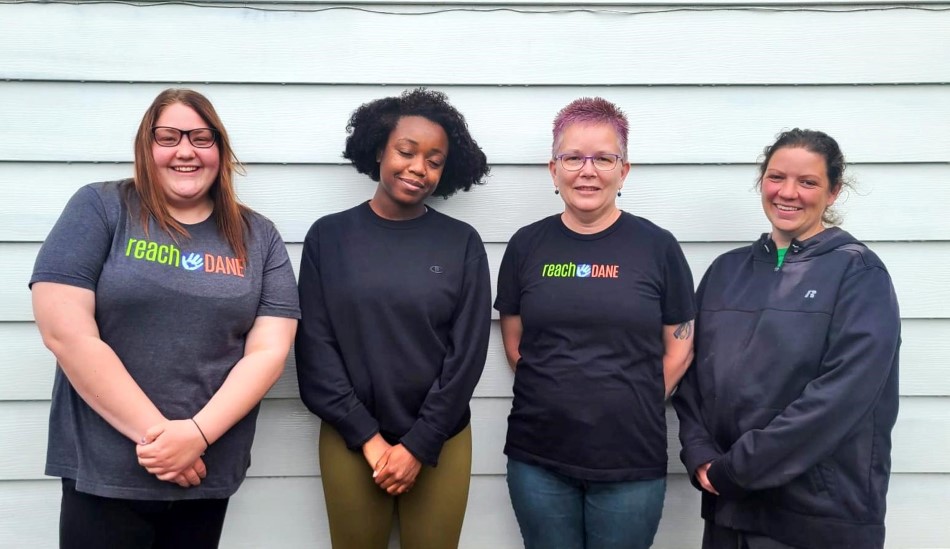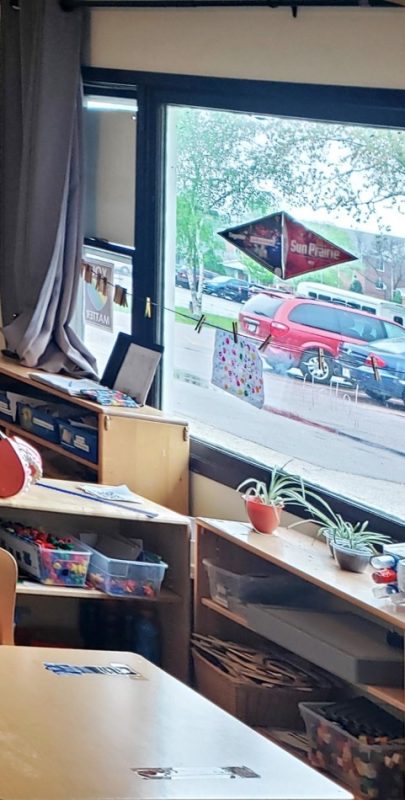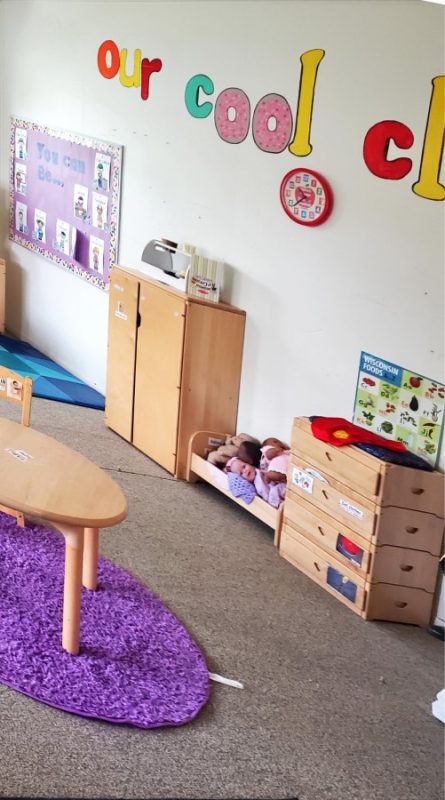Teacher Profile: Sun Prairie
Sun Prairie Head Start Team
About the Team
Kristi Barr – Lead teacher
Circe Resendez – Lead teacher
Joetu Garwo – Assistant teacher
Harley Teske – Assistant teacher

Activities and Play in the Classroom
Kristi: I think just having fun conversations with them to learn about them and how they’re feeling.
Harley: I like free choice play time and see how they’ve changed throughout the year. From what different things that they come up with when they’re in dramatic play.
Joetu: In the afternoon, we do a lot of different cool experiments. [I like] seeing how they react to what they’re really into.
Circe: [I like] spending time [with them]. I like to dance with them in the mornings, seeing them learn their letters and how they grow throughout the year.
Kristi: Just sit with them and encourage them to play with friends. We have a couple of particular kids that enjoy playing with adults more, so we just encourage them to find a friend to play with. It’s really the social piece that helping develop social skills and sensory.
In addition, she shared that their curriculum had the solution cards that helped to solve the fight problem.
Circe: I think by modeling. Like two of us will sit at the table and we’ll start playing Candyland, and then the kids come over. Because we’re playing together and so we’re modeling that they can play together.
Harley: [I support them] to switch off to centers and make sure that there’s lots for them to stay engaged, so they don’t get bored with the same things all the time.

Working with Children and Families
Kristi: One day, I was having a really bad day, and Miss R was at circle time and asking everybody what they’re really good at. When she got to me, I said I’m not really good at anything. And one of our little guys says, “Miss Kristi, you are really good at teaching children”. For me, that was a really powerful moment.
Harley: We have a child who kind of struggled and she’s got some stuff going on at home. When she came to me and said, “I’m glad you’re my teacher, I’m glad you’re here for me.” She might be struggling at home, but I’m glad that she likes to come to school, and she has good teachers.
Circe: We had some rough kids last year and one was nonverbal. Just watching her participating in activities was a big wow moment for me.
Joetu: Kids are happy to see us. We had a student who was out for three months, and she went to Africa. Just her being excited to see us and come back into the classroom and everything.
Kristi: We use the app to document stuff for parents, and we can take a picture, message them with a picture, and we can say what children did for the day or send them individual message like can we talk to you when you come today.
Each child has their own portfolio so we can put work samples in or pictures for parent-teacher conference forms. And it’s kept for the whole time that they’re here.
Circe: I’m doing this both virtual and in house. I’ve been building relationship with the parents and that was a big thing of texting them on my phone about what’s coming up today. Sometimes the virtual kids are really hard to get on, just setting that all up for families is very well used this year.
I think another thing was we divided small groups into their abilities. We could pinpoint different things to work on.”
Harley: Being able to connect with parents as I’m one of the closers. I’m usually the one talking to parents sometimes in the afternoon. And then they ask us about how children’s day went, and we can tell them.
Kristi: We think parents know their child best. It’s important that we know what’s going on [about the kids] because some of our kids are in really hard places, homeless, and foster care. So, it’s important to know and work with families, so that we know how to support them. Because Head Start works with the whole family that needs help to find jobs and to get psychologists. I think sometimes we are the only person to talk to, sometimes they come in and they don’t necessarily want to talk about their kids, but they want to talk about like a movie or what they’re going to make for dinner. Just be friendly and let them chat with somebody.
Circe mentioned that sometimes it was not easy to work with families.
Sometimes the interactions aren’t so nice. It’s hard to just keep that professional level and to interact in certain situation. There’s been certain situations where one of us has to step away.
Working in Early Childhood Education
Kristi: I think separating our kids into groups. We’re not feeling as overwhelmed because we’re planning for four kids instead of 17. I think that’s easier because you can do more, and you have less kids.
In the morning I just make sure that I try to greet every child with a good morning and say,” I’m glad to see you today”. Because it makes them feel like they belong here.
Circe: I think is [working] as a team. We don’t have different rules and expectations that we’re all the same across the board.”
Harley provided an example:
When we’re working with children, and if there’s a behavioral problem going on and one teacher need to step away for a minute. She can give another teacher a signal like I need to take five minutes [off] or just having them come in and help that child instead.

Kristi: One thing I can think off the top of my head is when parents don’t follow through, it’s not necessarily about the kids, but when you talk with a pair and they say that they need to work or they say ‘okay, I’ll work on it’, and then it never happens. There’s always consistently [working against] like certain parents don’t come for parent-teacher conference. Those types of things are frustrating for me.
Circe: Sometimes we have to bend over backwards more than what any other teachers would do, just to satisfy and get our kids to come to school. It’s really exhausting and overwhelming. [For instance], one of our students is homeless and living in a hotel, it’s so hard to get her to school and you have to call and call and wait and wait…
Kristi said it might because “4K is not mandatory and it’s not like kindergarten or first grade where you have to go.”
Joetu: I think something that drives me crazy is with myself. If I don’t really support a child in a situation well, that drives me a little crazy.
Harley: For me, it’s the behavioral issues and stuff. I change my attitude towards the most challenging kids. It’s not how I normally would do like trying to help for solving the problem, I will explain it and calmly approach the problem. I go into it in a different way and do a lot of self-reflection.
Circe wished to have rich supplies, materials and books for the Head Start.
Circe: I would like to be able to go into classrooms that has a lot of funding and be able to have access to the stuff.
Harley: More resources, or more material, more help for the children and stuff [staff?], and the families.”
Joetu: I agree with these two because even today, a kid told us that she didn’t have a bed to sleep on. If we can just go to the store and get that for them, [that would be] with no problem.
Circe: We gave away a lot of things for the kids to have at home because they don’t have any of that stuff at home. … We would like to put an outdoor classroom in our room at some point, because that would be exciting. And we will need a home. We are being kicked out of where we’re at, and so we’re trying to find another place, hopefully before the next year.
Kristi: I want to be able to have time to sit and plan appropriately, go to the library and get books that we can use for the week. … Ideally, we would like to have a full day of planning time.
Kristi: I think we’ve had excellent training and most of our classes are students of color. This is how we’ve been trained and how we’ve done. Each game does a lot of the training with best practices and trauma informed teaching time. I think all schools are lacking that because it works for every child.
Kristi: We have a social emotional specialist that we can refer to. If you’re struggling with social emotional issue, what I do is to pick up the phone and call her, and she’s right there. Or you email and say I need to meet with you tomorrow.
Harley: It’s very important to work with kids and it’s very important that the kids have consistent caregivers that they can trust and stuff taking on everything and working with them. We’re going to be here with them.
Circe: [Home visits] are new to me too and I was scared at first. But you have to go with an open mind and can’t judge. Just getting back and listening to what they really need from you.
Kristi: When you approach a home visit with a parent and [they say], “I don’t want you in my home,” you need to say, “I’m not here to judge you, I’m here to talk about your child. We can even meet outside if that’s what you want”. Maybe bend a little bit so that you can build that trust and you can get to the meaningful conversation.
Circe: If the parents don’t trust us and it’s really hard to do our job. We don’t know any information about [the kids].
